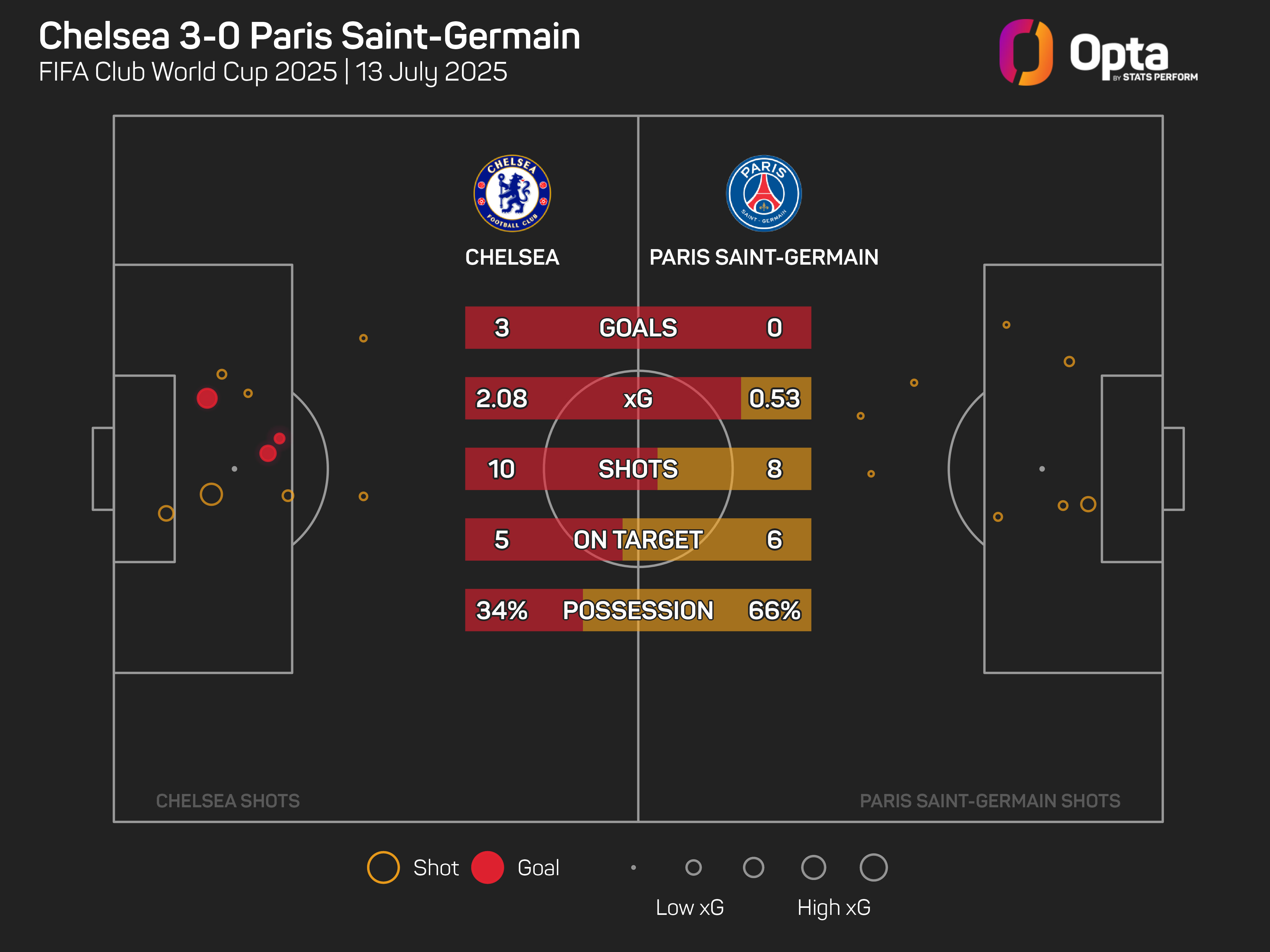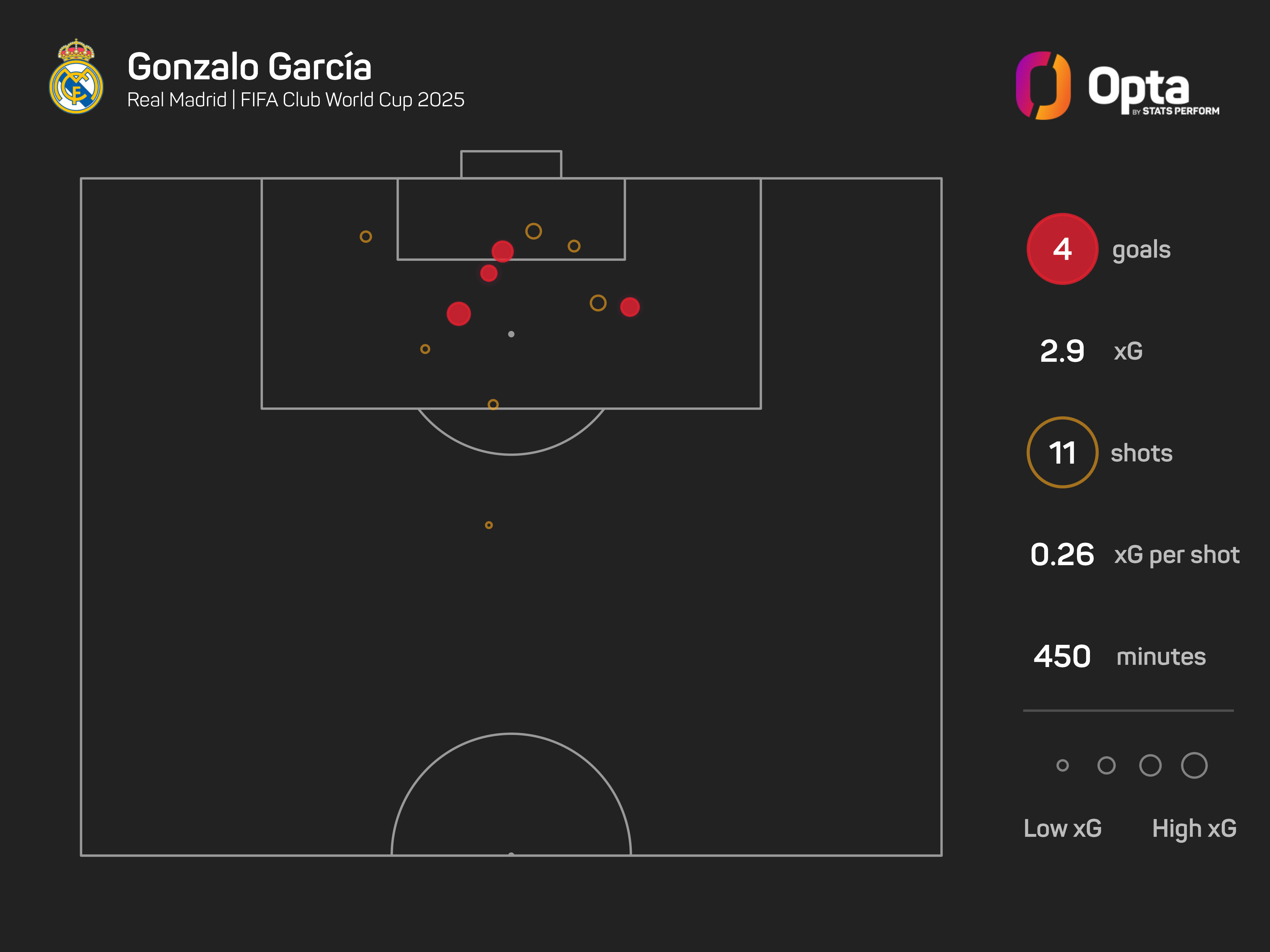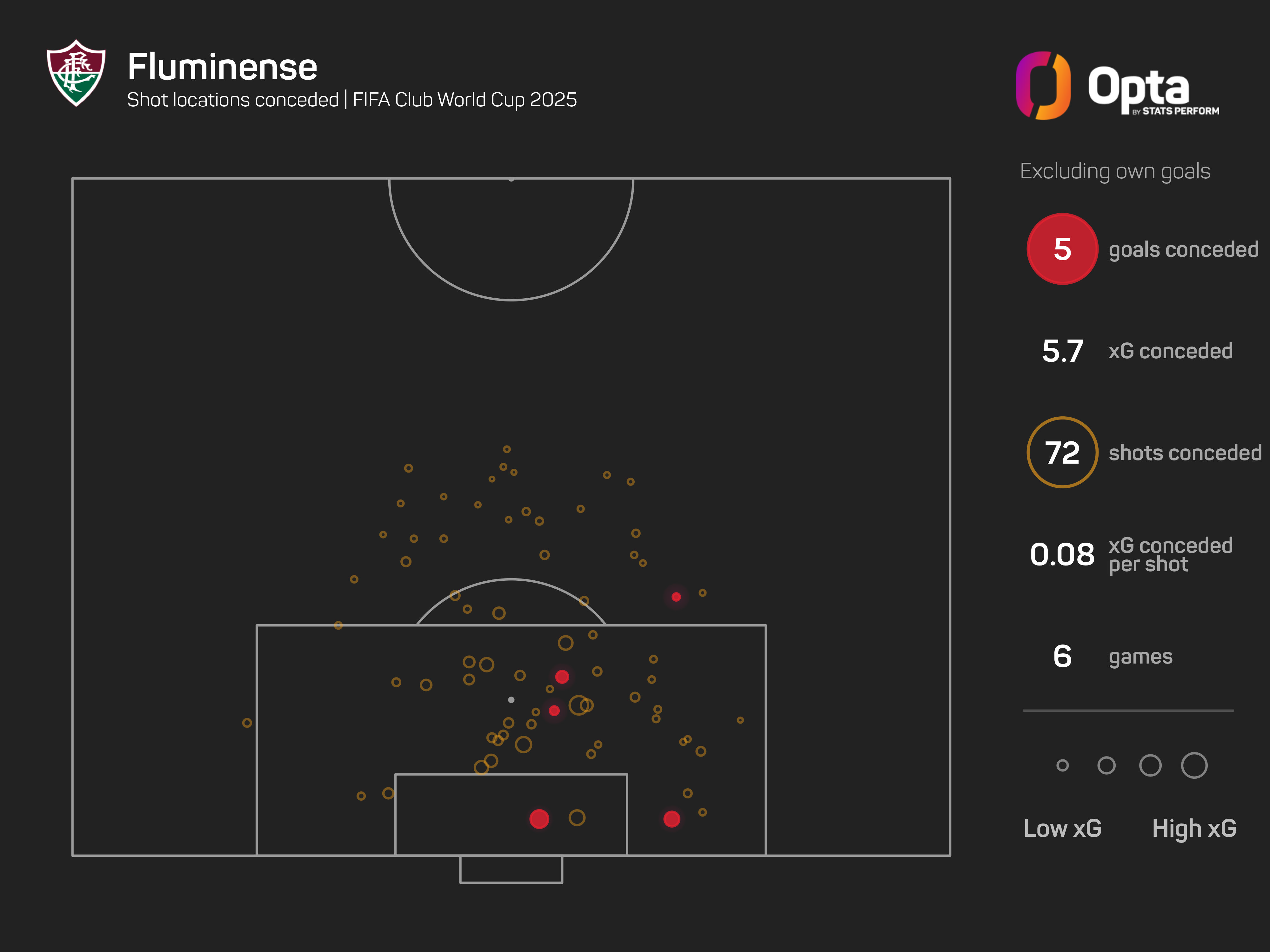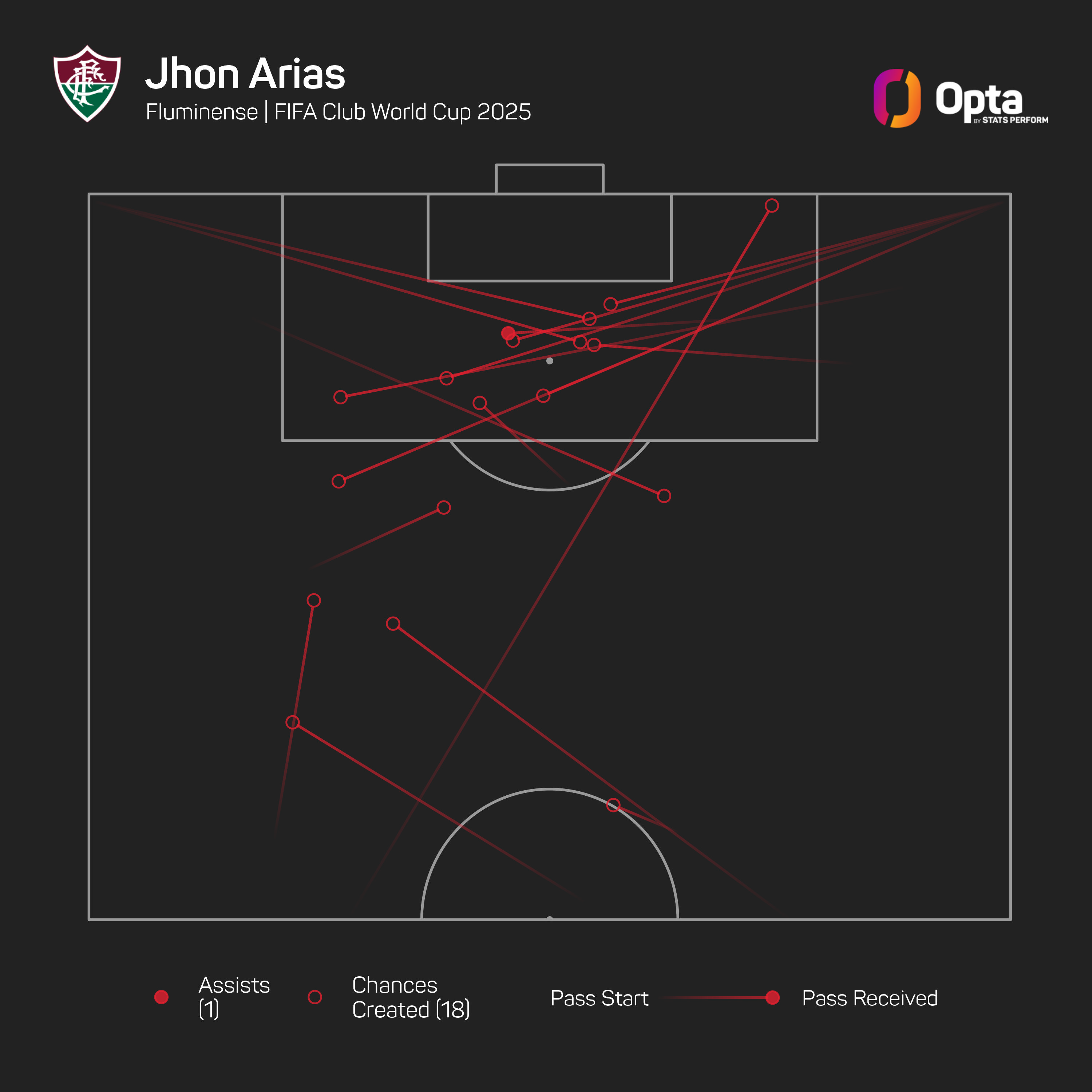18h29 CEST
14/07/2025
The first 32-team Club World Cup came to an end on Sunday, with FIFA's revamped competition providing plenty of thrills and spills along the way.
Over the last month, teams from six different confederations battled it out to become world champions, but there could only be one winner in the United States.
The victors were Chelsea, who put on a faultless showing to dismantle Champions League winners Paris Saint-Germain 3-0 in the final, led by Cole Palmer's brilliance.
That win saw Enzo Maresca clinch the second title of his 12-month tenure at the club, having guided them to the Conference League crown with a 4-1 triumph over Real Betis in May.
Donald Trump made headlines off the pitch as he joined in with the Blues' trophy lift, but it was Chelsea's young team who made themselves great again on the world stage.
But who were the standout teams and the top performers in the competition? Here, we delve into the Opta data to find out.
CHAMPIONS OF THE WORLD. pic.twitter.com/wWUEoi25Ov
— Chelsea FC (@ChelseaFC) July 13, 2025
Maresca makes his mark
Ahead of the tournament, Chelsea were given just an 8.2% probability of lifting the title, but the Blues ripped up the script to clinch their second Club World Cup crown.
Indeed, Chelsea became the fifth team to win the competition on multiple occasions, joining Real Madrid (six), Barcelona (three), Bayern Munich and Corinthians (both two).
They have now won each of their last six international finals (excluding Super Cups) dating back to 2013, last losing in the 2012 Club World Cup final against Corinthians.
Maresca's men stunned the European champions with a first-half blitz that saw Palmer score twice before Joao Pedro continued his stunning start to life at Chelsea with a dinked finish over Gianluigi Donnarumma.
Chelsea won a final by a three-goal margin for the fourth time, also doing so in the 1955 Community Shield (3-0 versus Newcastle United), 2019 Europa League (4-1 versus Arsenal) and the 2025 Conference League (4-1 versus Real Betis).

Their victory was led by Palmer, who, after recording two assists in the Conference League final, became only the second Chelsea player in the Premier League era to record multiple goal contributions in multiple finals (after Didier Drogba - 2005 Community Shield, 2007 EFL Cup).
He created 12 chances throughout the tournament, more than any other player for Chelsea, with his three goals also a team-high total, alongside the impressive Pedro Neto.
The Blues were anchored by Moises Caicedo and Enzo Fernandez, with the pair more than living up to their price tags as two of the most expensive midfielders in world football.
Caicedo was one of four players at the tournament to record 15+ tackles (19), win 30+ duels (33) and have 400+ touches (425), while no player registered more assists than Fernandez (three).
Chelsea also finished as the top scorers with 17 goals from an expected goals (xG) total of 12.48, while scoring a competition-high seven goals from fast breaks, showing that Maresca's style of play is beginning to evolve.
They also had a solid foundation to build on at the back, with only PSG and Palmeiras (both four) conceding fewer goals than Chelsea (five) of the sides to make it to the last 16.
Robert Sanchez's future at the club had been a talking point throughout the season, but he quietened his critics by winning the Golden Glove. According to Opta's expected goals against (XGoT) model, he prevented 2.1 goals throughout the tournament.
Garcia takes his chance in Mbappe's absence
The Club World Cup unearthed several hidden talents, but none shone brighter than Real Madrid's Gonzalo Garcia, who scooped the Golden Boot.
Garcia came into the competition as a relative unknown, having made just four appearances for Los Blancos prior to their campaign getting under way in Miami.
But with the news that star striker Kylian Mbappe had been admitted to hospital with acute gastroenteritis, Xabi Alonso had no choice but to turn to the 21-year-old.
It was an opportunity Garcia grasped with both hands, netting four times and providing one assist in six games before Madrid's defeat to PSG in the semi-finals.
Indeed, he was the only player to directly contribute to a goal in each of his team's first five matches at this edition of the Club World Cup, before firing a blank against PSG.

Garcia was one of four players to score four times in the competition, alongside Al-Hilal's Marcos Leonardo, Benfica's Angel Di Maria and Borussia Dortmund's Serhou Guirassy.
But the award was given to him thanks to his assist in their group-stage win over Pachuca, laying the ball on for Arda Guler to score Madrid's second goal in a 3-1 victory.
Of those four players, Garcia also had the lowest xG total with 2.88, giving him an overperformance of 1.12, while he also had the fewest shots (11).
He had the best conversion rate with 36.36%, compared to Leonardo (26.67%), Di Maria (28.57%) and Guirassy (22.22%), showing his deadly instincts in front of goal.
It remains to be seen what role Garcia will play during Alonso's first season in the Spanish capital, but his displays at this tournament showed he has the quality to step up.
Fluminense and Palmeiras put South America on the map
Not many would have predicted Fluminense or Palmeiras to enjoy deep runs, but Brazilian sides in general impressed at the tournament.
Botafogo's win over PSG in Group B was the first by a South American team over a European side at the Club World Cup since Corinthians beat Chelsea in the 2012 final.
Flamengo then stunned eventual champions Chelsea 3-1 in Group D, helped by Nicolas Jackson's red card. That marked only the second time a team from South America had beaten a European side by multiple goals at any Club World Cup.
It was Fluminense who went the furthest among the non-European teams, reaching the semi-finals before they were beaten by Chelsea, having dumped out Champions League runners-up Inter in the last 16.
Only Chelsea (20), Madrid (13), Al-Hilal and Palmeiras (both 11) had more fast breaks than Fluminense (seven, level with PSG) of those who made it to the knockout stages, though the Rio de Janeiro side did face 72 shots, the third-most among all teams to make the last 16.

Another side who impressed were Al-Hilal, who entered the tournament under new management after Simone Inzaghi swapped Serie A for the Saudi Pro League.
They inflicted Pep Guardiola's first defeat at the Club World Cup, ending the Spaniard's streak of 11 straight wins with a dramatic 4-3 victory over Manchester City after extra-time in the last 16.
And despite the attacking quality of Leonardo and Malcom, it was the defensive unit led by Kalidou Koulibaly that really caught the eye. Of the teams to reach the knockout stages, only Botafogo (31) made more blocks than Al-Hilal (23).
That backline was regularly tested, with Al-Hilal facing 85 shots throughout the tournament, the joint-second most alongside Madrid. Only part-time outfit Auckland City (101) faced more, though they did concede a tournament-high 17 goals, including 10 against Bayern Munich.
Al-Hilal conceded just eight goals, which was largely down to Yassine Bounou's heroics. He made 25 saves, with only Juventus' Michele Di Gregorio (27) making more.
Silva rolls back the years as Arias stars
At 40 years old, Thiago Silva continues to look as fresh as ever, with the Brazilian stalwart crucial in Fluminense's run to the last four.
Indeed, Silva ranked first among all defenders for headed clearances (23), fifth for total clearances (30) and joint-third for aerial duels won (13, with Marquinhos).
His displays saw him named in the Team of the Tournament alongside former team-mate Marquinhos. The pair made 194 appearances together for PSG from 2013 to 2020.
Jhon Arias also impressed for Fluminense, with his displays seeing him linked with a move to Premier League side Wolves.
The Colombian created more chances (18) than any other player in the competition, six of which came against Ulsan Hyundai in their group-stage clash. Arias also scored a stunning free-kick in that match, which Fluminense won 4-2.
He also played 100 passes that ended in the final third, a total only bettered by Nicolo Barella (109), Aleksandar Pavlovic (121), Joshua Kimmich, Achraf Hakimi (both 162) and Vitinha (164).

But it seems fitting to end on a final note from the tournament victors, Chelsea, who have potentially solved their striker crisis after the arrival of Joao Pedro from Brighton.
The Brazilian joined for a reported £60m ahead of their quarter-final against Palmeiras, and he may have already paid that fee back in just three outings.
He scored three goals at the Club World Cup, two of which came against former side Fluminense, from just six shots (0.85 xG), which is both the lowest xG and the joint-fewest shots of any player in the competition to have scored three or more goals.
And after scoring in the final, Joao Pedro became the first Chelsea player in the Premier League era to score three times in his first two starts for the club in all competitions.
But the fun is now over for another four years, with Maresca's team holding the bragging rights of being "world champions" until at least 2029.